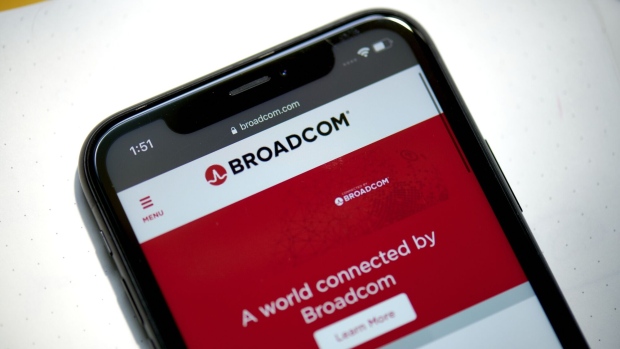Mar 7, 2024
Broadcom Chip Revenue Misses Estimates Even as AI Demand Grows
, Bloomberg News

(Bloomberg) -- Broadcom Inc., a chip supplier for Apple Inc. and other big tech companies, suffered its worst stock decline in four years after reporting disappointing revenue from its semiconductor business, even as AI demand grew faster than expected.
The company’s semiconductor division posted revenue of $7.39 billion in the fiscal first quarter, Broadcom said Thursday, missing the $7.7 billion projected by analysts. Still, the chipmaker remains on track for $50 billion in sales during fiscal 2024, which ends in October. That’s in line with its previous forecast.
Though an artificial intelligence boom is fueling demand for Broadcom equipment, the company is contending with slower sales in some segments, such as telecommunications. That’s hurting its chip business. Broadcom’s infrastructure software sales, meanwhile, beat analysts’ estimates.
The company’s stock, which had been up 26% this year through Thursday, fell 7% on Friday in New York. That was its biggest single-day drop since March 2020, the early days of the pandemic. Shares of fellow chipmaker Marvell Technology Inc. also slid, hurt by a weak forecast. It too has been seen as a beneficiary of AI spending.
Speaking on a conference call with analysts, Chief Executive Officer Hock Tan said AI spending would strengthen this year. The Palo Alto, California-based company now expects the demand to account for 35% of its semiconductor revenue in fiscal 2024, up from a previous forecast of 25%.
Nvidia Corp.’s stratospheric rise in the past year has sent investors looking for other companies poised to get an AI windfall. Broadcom doesn’t make Nvidia-style chips — ones used to train the large language models that power AI tools — but it does supply vital networking components and handles custom chip design work. That makes it integral to the giant data centers that are processing AI workloads.
Despite missing estimates for chip revenue, Tan said demand was strong for its networking products from AI data centers and that large cloud computing providers are clamoring for its custom artificial intelligence chips. They are “driving growth in our semiconductor segment,” he said in a statement.
Broadcom’s profit was $10.99 a share in the first quarter, excluding some items. Analysts had predicted $10.42 a share for the period, which ended Feb. 4. Total revenue rose 34% to $11.96 billion, compared with an average analyst estimate of $11.8 billion.
Software demand helped make up for semiconductor sales that were more sluggish than predicted. The infrastructure software division posted revenue of $4.57 billion, beating the $4.33 billion projection. Broadcom has suspended quarterly projections while it integrates and restructures its acquisition of software maker VMware.
Broadcom’s Tan has built one of the largest companies in the chip industry through a string of acquisitions. He’s also diversified the business with a push into software — an effort bolstered by the recent purchase of VMware. The integration of that deal will take a year and cost about a billion dollars, including the expense of laying off workers, Tan has said.
Broadcom provides key components for Apple’s iPhone, designs custom chips for Alphabet Inc.’s Google and is the biggest supplier of networking components that direct traffic between computers in data centers. During earnings calls, Tan typically gives updates on Broadcom’s at-times contentious relationship with Apple, though he refers to it obliquely as his “North American customer” or another vague moniker.
On Thursday, Tan said Broadcom has a “very deep strategic and multiyear relationship” with the customer.
--With assistance from Mark Gurman.
©2024 Bloomberg L.P.





